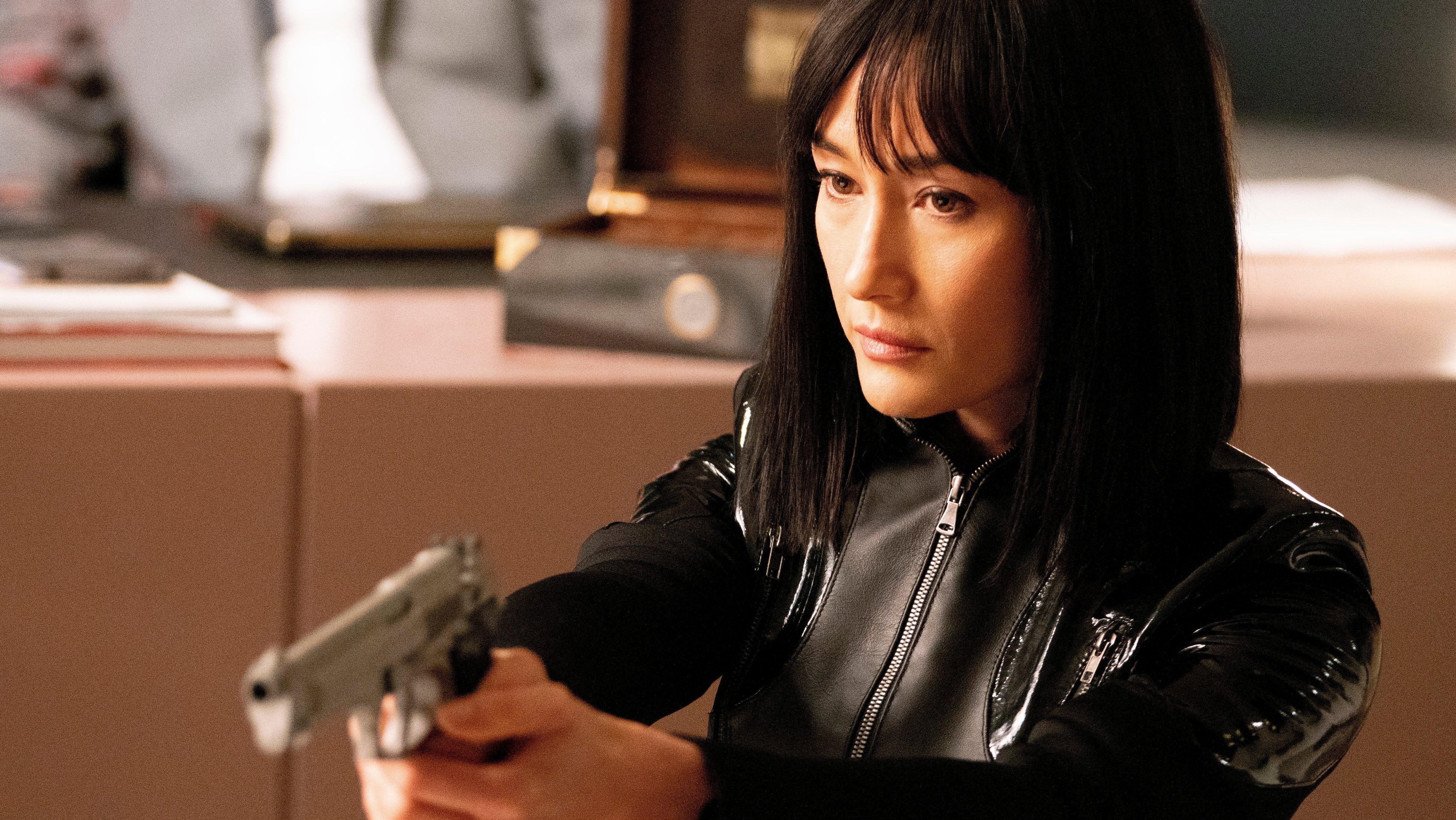“A bookstore owned by an assassin… never saw that one coming,” says Rembrandt (Michael Keaton) in The Protégé, in a rare instance of a character played by the actor not coming across like the smartest guy in the room. The real surprise about the store owned by master assassin Anna (Maggie Q) is that it actually stocks a substantial collection of used books, rather than concealing a John Wick-style armory. Anna really does enjoy her sideline in buying and selling rare first editions—and anyone who shares her interest will find the movie’s violence horrifying. No, not the headshots augmented with cheesy, ugly spatters of CG blood, but a subsequent scene of bookstore carnage that sends tattered pages flying through the air.
Anna’s attitude about her night job is curious. Her store is successful enough to have at least one other employee, and she doesn’t appear to have the type of clients who would refuse her attempts to retire from freelancing, so it’s unclear why she hasn’t switched to bookselling full-time. Maybe it feels to her like a family business; her closest associate is fellow hitman Moody (Samuel L. Jackson), who has been a father figure ever since he stumbled across her on an unidentified mission to Vietnam in 1991, and the two share a disarmingly warm rapport (especially when they’re disarming and murdering various goons). When mysterious henchmen come for Moody and others in Anna’s circle, it’s not because any of them have tried to leave the business. Anna simply takes an innocuous-sounding missing-person case that doesn’t even involve knocking anyone off. After vicious attacks attempt to warn her off the inquiry, this expert multitasker continues the investigation while plotting to retaliate against the bad guys. This takes her back to Vietnam, though the generic interiors don’t make much use of the location.
That’s where Keaton’s smarter-than-the-room routine comes in. In a movie that repeatedly replaces its seeming Final Boss, and not with successively more interesting characters, Keaton’s Rembrandt weasels in from the side; he’s a self-described “after-the-facts” guy sent by Anna’s enemies to organize, analyze, and occasionally perform hand-to-hand combat, by the grace of Keaton’s talented stunt double. Rembrandt also strikes up a flirtation with Anna, a stunt Keaton performs himself. Their exchanges are almost certainly in the script by Richard Wenk, penner of movies where stars ranging from medium old to decidedly old to old souls are forced to take action. It’s too close to that wheelhouse, and too extensive, to be a plausible improv. Yet Rembrandt’s interest in Anna plays, delightfully, like a classic Keaton aside allowed to mutate into its own weird little subplot, a natural outgrowth of the way his character pauses to extol the virtues of bone broth or inquire about the source of a man’s suit. If their dynamic has a playful queasiness, at least it’s an antidote to the steadfast sexlessness of so many action movies, including polite young superheroes and the mostly-celibate old men Wenk specializes in writing.
That Wenk is now writing about a female assassin should hardly count as a flipped script; distaff John Wicks are so hot right now. But that non-front of a bookstore is an early clue that The Protégé isn’t really a Wick riff (despite name-checking the Keanu series in its ads). It’s a straightforward genre picture, directed with the trademark sleek clarity of Martin Campbell, best known for steering two different Bond reboots. His recent gigs are lower-profile, but still well-crafted. Apart from some parceled-out flashbacks of questionable utility, this new one is sillier and less grim than The Foreigner, his previous foray into a style of movie that now seems destined for Netflix surfing—the 21st-century equivalent of the lazy Sunday-afternoon cable watch. As with The Foreigner, The Protégé becomes a theatrical release by the dogged professionalism of its filmmaking and the radiance of its star power.
That star power isn’t just from Keaton and Jackson, exercising their enviable ability to have fun whittling some character put of the standard-issue blocks of wood they’ve been handed. The Protégé is also a belated Hollywood star vehicle for Maggie Q and her no-nonsense charisma. Beyond considerable physical presence, Q brings touches of subtlety to a stock character; by the time she makes her eventual, inevitable reference to wanting to get out of the game, there’s a genuine weariness that feels earned enough to bypass the cliché. Elsewhere, a different cliché more specific to female action stars is enthusiastically embraced: Anna receives more elaborate outfitting than her male counterparts. It might feel condescending if Maggie Q didn’t look so at home throughout her stunning and lovingly ridiculous variety of costume changes: fancy dresses, catsuits, practical skulkwear.
Plenty of people will vibe with the efficiency of The Protégé on an airplane, or on Netflix, or maybe even on TNT in a few years, and that’s fine; it’s hardly the kind of movie that will inspire another round of debate about the waning theatrical experience. Yet there is something resonant about the characters’ appreciation for tangible evidence of the past, including Anna’s first editions and Moody’s prized vintage electric guitar. Campbell and Wenk haven’t inserted many gratuitous, self-mythologizing references to “going old school” as a sop to their target audience. They let their old-fashioned programmer speak for itself, mostly just by making it with a bit more flair than strictly necessary. This is a movie where the audience can temporarily believe that the ruthless assassin owns that bookstore.


